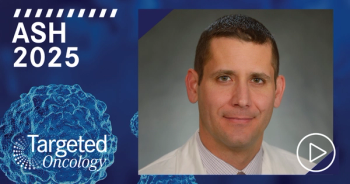
Discussion of Phase 2 IFM 2018-04 Study Data Presented at 2023 ASH Examining DARA+VTd with Tandem ASCT for High Risk Transplant-Eligible Newly Diagnosed Multiple Myeloma
Summary of findings presented at the 2023 ASH meeting from this phase 2 trial using daratumumab, bortezomib, thalidomide and dexamethasone with tandem autologous stem cell transplant in high risk newly diagnosed multiple myeloma patients.
Episodes in this series

Case: A 54-Year-Old Woman with Newly Diagnosed Multiple Myeloma (NDMM)
Clinical Presentation:
- FH is a 54-year-old woman who presents to her physician with complaints of back pain, fatigue, nausea, constipation, and occasional, but recurring dizziness
Initial Clinical Workup and Diagnosis:
- Hb 7.0 g/dL
- Calcium 11.3 mg/dL
- Creatinine, 1.5 mg/dL
- Albumin, 3.2 g/dL
- β2-microglobulin, 6.0 mg/dL
- LDH 200 U/L
- Bone marrow biopsy showed monoclonal plasma cells, 22%.
- Serum monoclonal protein, 5.0 g/dL
- Serum kappa FLC, 240.0 mg/L
- FISH: (+) IGH Translocations; none
- ECOG PS 1
- AG was diagnosed with R-ISS stage II/R2-ISS stage III IgG-kappa myeloma.
- CAR T eligible
Treatment:
- Patient was initiated on daratumumab/bortezomib/ lenalidomide/ dexamethasone (D-VRd) induction therapy prior to receiving ASCT, followed by lenalidomide maintenance therapy.
- She achieved VGPR post-induction, and
- Maintained VGPR post-ASCT
This is a video synopsis/summary of a Case-Based Peer Perspective featuring: Douglas Sborov, MD.
The phase 2 IFM-2018-04 trial, whose data were presented at the 2023 American Society of Hematology (ASH) annual meeting, included transplant-eligible patients with newly diagnosed multiple myeloma with high-risk cytogenetic abnormalities translocation (4;14), translocation (14;16), or deletion 17p. Patients received 6 cycles of daratumumab-carfilzomib-lenalidomide-dexamethasone (Dara-KRD) induction, stem cell mobilization/collection, autologous stem cell transplant, 4 cycles of Dara-KRD consolidation, a second transplant, then 2 years of Dara-lenalidomide maintenance.
Of 50 patients, 8% had extramedullary disease, 6% had primary plasma cell leukemia, and 60% had 2 or more high-risk features. Post second transplant, 81% achieved a complete response or better and 96% were minimal residual disease negative (10-6 threshold). At 32-month median follow-up, 30-month progression-free survival was 80% and overall survival 91%.
Video synopsis is AI-generated and reviewed by Targeted Oncology® editorial staff.









































